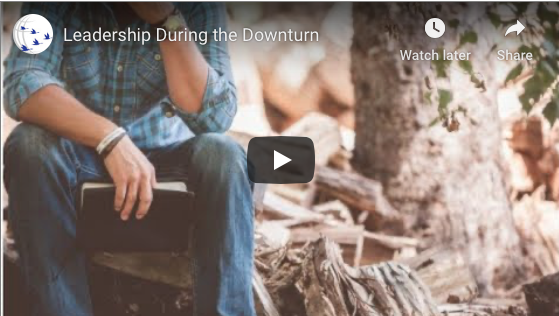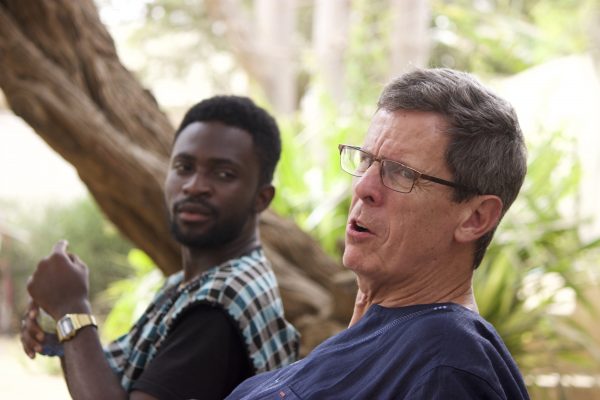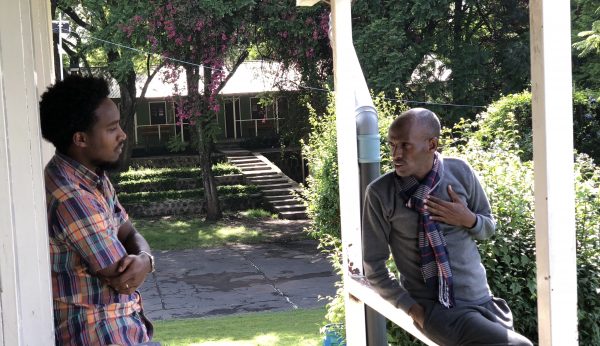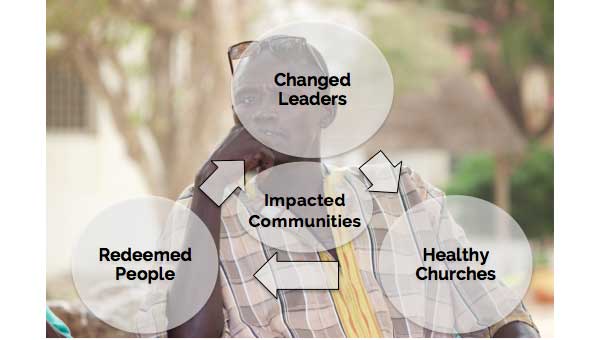“Servant leadership” is a term often used to describe how Jesus led – a servant to His followers. So are “servant leadership” and “Christ-centered leadership” one and the same? Or is there a distinction between a servant leader and a Christ-centered leader? Herman Hesse once told the story of a band of men on a mythical journey. The central figure in the story is Leo who accompanies the party as a servant. He does the menial chores for the group, but he also sustains them with his positive attitude and with song. Leo is a person of extraordinary presence. All goes well for the band of men until Leo disappears. At which time the group falls into disarray and their journey is abandoned. They cannot make it without Leo. Some years later, Leo is found and taken into the Order that sponsored the journey. As it turns out, Leo the servant, was the head of the Order, a noble leader. Servant as Leader The idea of Servant as Leader first came to Robert Greenleaf in 1958 as he read this story. At the time, he was an executive at AT&T, and was searching for approaches to leadership that would successfully mobilize the new generation of anti-establishment workers. In Servant Leadership: A Journey into the Nature of Legitimate Power and Greatness (1977), Greenleaf posed the question “Who is the servant leader?” He answered by writing: “The servant-leader is servant first . . . It begins with the natural feeling that one wants
Read morePatrick Lencioni asserts that there are only two motives that drive people to become a leader.1 I have worked with both.
Read moreSelf-awareness is a leadership buzzword — and for good reason. Leaders who are self-aware build stronger relationships, communicate more effectively, and tend to make better decisions. Yet self-awareness among leaders – especially among more experienced, higher-level ones – is a rare quality.
Read moreEpisode 1 of our new video blog is here! A Roundtable Discussion. How a leader responds to a crisis deeply impacts the culture of the organization. It is not so much about how a leader acts in crisis, but about how he or she reacts. A leader’s reaction to crisis will inform people about what is most important and what is inherently valued. As we all face the current crisis of COVID-19, this is a continuing discussion for leaders. Because we want it to be a discussion we have attempted to talk about it and invite you into the conversation.
Read moreAt times the grind of leadership can seem futile. One that could attest to that reality would have been the Old Testament prophet Daniel. He had every right to wallow in self-pity, thinking that his life and leadership were a waste. The Sunday School conception of Daniel’s days was like a continuous prime time flick of hanging out in the lion’s den, interpreting King Nebuchadnezzar’s dreams, receiving historic prophetic visions, and seeing handwriting on the wall. But all these experiences made up a very small part of his work life.
Read moreAbout 600 million people heard these words live from Neil Armstrong when he stepped for the first time onto the surface of the moon. As the iconic news anchor Walter Cronkite narrated this historic moment over CBS News on July 20, 1969, grainy images transmitted over television screens of an other-worldly space capsule touching down made the event seem simple and serene.
Read moreAs winter creeps slowly into spring, Freedom to Lead is also experiencing a new season. Our travel calendars are packed full from now until December. We are grateful for being able to continue what was birthed back in 2009. At the same time we wonder how to cover all the opportunities. New initiatives are being started and new dreams are being explored. 2019 is a year of possibility.
Read moreThe Discipline of Remembering Remember your leaders who spoke the Word of God to you – Hebrews 13:7a Since childhood, the churches I’ve attended emphasize “holy habits” that should be part of a Christian’s routine; bible reading, prayer, and deeds of compassion are always high on the list. However, the practice of remembering never seems to make the cut. That’s a mistake. Remembering our story of God’s faithfulness is essential to our present faith and our future hope.
Read moreIt was William Shakespeare who said, “Some people are born great, some achieve greatness, and some have greatness thrust upon them.” Are leaders born or made? Are leaders in leadership because of natural giftedness or because they arose to the occasion at the time it was needed? Leadership Development or Leadership Emergence The first thing we need to establish if we’re going to have a working definition of leadership development is to differentiate it from leadership emergence.
Read moreLeadership development. It’s become something of a fad. Today organizations love to talk about it. If a church or ministry offers a “leadership development” program, then they feel like they’re well on their way. How do we define leadership development?
Read moreEvery ministry leader is a steward of power. The use of power can either cultivate potential in others and achieve desired results, or it can harm people and stall progress. Here are four lessons for leaders to keep in mind as we navigate the types of power at our disposal. Lesson #1: The exercise of power is not the same as the practice of leadership. As author Jim Collins says in Good to Great and the Social Sectors, “If I put a loaded gun to your head, I can get you to do things you might not otherwise do, but I’ve not practiced leadership; I’ve exercised power.” If people follow because they have no choice, then that’s not leading.
Read moreAs we begin a new year into 2018, I see great parallels between long-distance running and the ministry we have with Freedom to Lead. These are personal things I’m learning as I’ve been putting my feet to the pavement these days. Let’s look at ten of these parallels as we “run hard” into a new year with new beginnings.
Read moreLast week we started by asking, “What happens on the Wednesday after Giving Tuesday?” In the several weeks between now and the end of the year we are inviting you to “go beyond” and take part in what God is doing through Freedom to Lead International®. Empowered by the Spirit, Freedom to Lead is catalyzing a cycle: We cultivate Christ-centered leaders. These leaders foster healthier churches. These churches attract new people who often become redeemed people. These people impact their communities with the gospel and become a fresh coalition of potential Christ-centered leaders. In other words, the cycle begins with changed leaders, and the outcome is changed churches, people, and communities.
Read moreThis week in America our families and friends will gather for a day of Thanksgiving. Since my heart surgery in September I have not eaten much sugar, gluten, or dairy, but for this special occasion I am looking forward to the carrot cake that will be made from my mother and grandmother’s recipe.
Read moreDuring the summer that I turned 37, my mentor asked me, “Have you decided what you want to be when you grow up? And how can I help you get there?” His tone was gentle. His words were warm. But his question was serious. It seems like the kind of question you ask a 5-year old. Or of someone who just finished high school. But at 37, much of my adult professional life has already been lived. I’ve grown in some areas, I’ve failed in others, but I’ve been doing it. Gone are the days of my idealistic youth. Idealism doesn’t leave a whole lot of margin for internal politics, unhealthy work cultures, and flawed systems. Nor does it account for the fact that we need to learn to master the “waiting game” as unfulfilled dreams to change the world rest.
Read moreReal People With Real Stories “Grace” is 30 years old. Every week she walks on rough roads through mountainous terrain for 25 miles in order to reach the community for Jesus. She is persecuted for her faith, but she persists in her ministry because her calling to the unreached is great. “Ian” worked among an unreached people group. He was one of the very few Christ followers that had made contact with these people. “Jerry” was building into Ian, developing him as a leader in order to grow the church there. Last month, Jerry’s phone alerted him that Ian was calling, except when he answered it wasn’t Ian. The person on the other end had to deliver the bad news that Ian had been killed in a car accident. Jerry lost not just a friend that day, but one of his strategic leaders in his network. With Ian now gone, who is going to carry on this work? These are real people with real stories. These are the people Freedom to Lead International has interacted with on the ground in Kenya this month. They are doing amazing work, but they are under-resourced. A Message For You FTL in East Africa Reaching the Unreached This month we have been meeting a network that spans nine countries in East Africa. They have requested Freedom to Lead International to provide our leadership development program (The Garden Project) for thousands of leaders throughout this large ministry that focuses on unreached people. After 40 of
Read moreMy grandmother used to help me to remember by saying, “Ricky, tie a string around your finger.” The logic, of course, was that when I saw the string, I would ask myself, “Why is the string there? Oh, I remember.” A string around my finger was kind of hard to forget. Christmas, too, is like a string around my finger. I have a way of forgetting, so each year the celebration of Jesus’ birth is a reminder of at least three things:
Read moreA primary responsibility of leadership is to initiate and manage change. Like many of my peers, I have eagerly embraced this role of change agent during my career. In fact, I like change – that I initiate. On the other hand, I haven’t been so receptive of change when someone else is initiating it. My track record is pretty typical when another leader has initiated change that affects me. Getting in touch with this common reaction is helpful to guide others through the difficult process of change. Most people are uncomfortable with change that someone else initiates, because change – even good change – often brings a sense of loss and grief. How leaders help their people navigate the grief of change often determines leadership success or failure. Leadership and the Five Stages of Grief
Read moreRetired Air Force General Jerry White shared a leadership principle that he practiced over the course of his decorated career: wise leaders seldom express their personal opinions. In light of the post-election unrest in America, our political leaders could have benefited everyone by heeding this advice.
Read moreFounder’s Syndrome If this musing by an organization’s founder on the value of organizational founders seems self-serving, indeed it is. But with the conventional avalanche of driveling complaints I hear and read about “founder’s syndrome,” it’s high time to speak up about the invaluable asset that many organizations forfeit when the founder walks out the door. Examples abound of founders who become a liability to the organizations they labored hard to birth and nurture. They hang on too long. Or they don’t know how to keep their noses out of the successor’s business. Founders whose tenures are long and whose track records are stellar can be particularly annoying when it’s time for a leadership change. Boards, stockholders, and staff are regularly warned of the dangers associated with transitioning founders. We get the message: founders can be a pain!
Read moreThe pending election for the leader of the free world has been hotly debated. The results will determine directions for our nation and planet in years to come. But this time around, millions of us are more deeply skeptical of our choices. Perhaps it’s because “virtuous leadership” needs more attention in our public discourse. The term “virtues” does not carry much credibility because it sounds like a throwback to the Victorian era. In generations past, leaders spoke of virtues, those beliefs and practices that provided common rules of engagement both in public and private life. These virtues included honesty, humility, fairness, justice, and individual dignity. Although our leaders did not always live up to these benchmarks, at least we agreed on what they were.
Read moreWhat does it take to become an expert? A popular writer cites the “10,000-hour rule.” According to this rule, if you practice for 10,000 hours, you will become an expert. But this rule is an oversimplification of important research: in fields as diverse as music, math, and leadership, deliberate practice is the only kind of practice that promises to produce excellence. 10,000 Hour Rule In his best-selling book Outliers, Malcolm Gladwell cited studies on expert violinists to promote the “10,000-hour rule.” He used Mozart as a prime example. Mozart learned to play at the age of four. Despite his musical genius – both as a performer and a composer – he practiced for thousands of hours to cultivate his art while other boys played with toy soldiers. So Gladwell does get the general concept correctly. To become an expert in any discipline – even for those with latent talent – takes tons of practice. But not all practice is equal.
Read moreThe 2020 Vision Statement of Freedom to Lead: In five years we will see 5000 storycentric leaders in 25 under-resourced countries being transformed into competent Christ-centered leaders. For the FTL Summer Blog Series, we have been unpacking our Vision Statement for the next five years. If you have missed any from this series, feel free to visit each one: Freedom From What? 25 Countries, 5000 Leaders Under Resourced Being Transformed Today we are going to talk about the competent leadership.
Read moreToday we are going to look at the word “under-resourced.”
Imagine for a moment – you have sensed a calling to lead others. You sense God wants you to lead in a church, in a business, or in a school. so where do you go to grow in your leadership?
Read moreEvangelism and missions both flow from the Great Commission – Christ’s command to “make disciples of every nation” (Matthew 28) by reaching them and teaching them. Isn’t this all just Great Commission work? Yes and no. There is a big difference between those that have been reached with the gospel and those that have not.
Read moreMovements and Institutions. It’s trendy to criticize institutions. Decaying behemoths that cater to the elites of a bygone cause are easy targets. Across the political and religious landscape, many prefer to associate with “movements” that eschew the traditional establishment in favor of an idealized future. Yet a nagging reality remains: any movement that does not institutionalize will not have lasting impact. In politics, movement is in; institution is out. New Jersey Governor Chris Christie has referred to Trump’s popularity in the current Republican race for the White House as a “movement.” Bernie Sanders’ “movement” has also resulted in his unlikely surge among disaffected voters. Institutions get backhanded in the religious world as well. For example, I just read another Christian leadership author who repeats the predictable mantra that movements are preferable over institutions. Although the vast majority of his book’s endorsements are from institutional leaders, the author pontificates that movements prioritize innovation and spontaneity while institutions focus on control that “quenches the Spirit.” We get the message: movements are good; institutions are bad.
Read moreDesperate Desire Everybody’s got a hungry heart. – Bruce Springsteen What is the longing within leaders to reach audacious goals, to “make a dent in the universe,” to leave a legacy? We are designed with this longing, and only freedom will lead us to our destiny.
Read moreCourageous Leadership Steven Spielberg’s film “Lincoln” highlighted a four-month period at the end of the Civil War in 1865 that is instructive for leaders facing a new year’s opportunities and challenges. The United States’ sixteenth president had declared that he hated the “zeal” for slavery’s expansion. “I hate it because of the monstrous injustice of slavery itself,” Lincoln said, and “I hate it because it . . . enables the enemies of free institutions, with plausibility, to taunt us as hypocrites—causes the real friends of freedom to doubt our sincerity.”1 Lincoln correctly calculated the task before him, and described the Emancipation Proclamation as “the central act of his administration.” His courageous leadership to end slavery was a pivotal event in American history.
Read moreGrumpiness and Stupidity are Remarkably Contagious Old-timers will remember that the Osmonds topped the pop charts in 1971 when they sang, One bad apple don’t spoil the whole bunch.” But when it comes to leading others to work together, this mantra just isn’t so. On the contrary, grumpiness and stupidity are remarkably contagious.
Read moreYears ago a friend gave me a picture book that promised to enable the viewer to “see what is invisible.” It was my first experience with stereograms, those incredible 3D images that look like a collection of jumbled shapes and colors, until you adjust your focus. At first it was frustrating. I really had to train my eyes to see in another way, to look beyond the two-dimensional surface. But once I did, all of a sudden the hidden image “appears” in 3D right before my eyes.
Read moreNobel prize-winning physicist Richard Feynman was asked to oversee a group of engineers who were tasked to perform a seemingly endless series of tedious calculations. The math wasn’t especially difficult for these engineers, but the work proceeded very slowly, and was full of errors. Feynman realized the problem wasn’t the math, but that the engineers were disengaged. He finally convinced his superiors to let the engineers in on the secret – they were performing calculations that would enable them to complete the race to build the atomic bomb before the Germans did. Their work would win the war. From that point forward, the engineers worked 10 times faster than before, with few mistakes and with fierce commitment. Does your leadership provide people with meaning that matters? The question might sound more like this: What is the overarching purpose that sustains our collective commitment to excellence in the tedious, less glamorous tasks of our day-to-day work? Does the work itself matter to us?
Read moreMost leaders say they want to finish well. Yet the majority don’t. Money, sex, pride, power, family problems, and stagnation are big barriers facing leaders who want to finish well. But what causes leaders to fall prey to these pitfalls? Why do successful, talented, and bright leaders so often sabotage their professional and personal lives through immoral and destructive behavior?
Read moreA middle-aged woman complained on Facebook about the lousy service she received at a local hot dog counter. She wrote, “The hot dogs were delicious, but the waiter was down-right rude.” She continued, “I’ll be looking for hot dogs someplace else.” Her post got lots of supportive responses. In the “Worthiness Era,” good products must be matched by good behavior.
We’ve heard enough news of Fortune 500 companies that shirk taxes while padding profits. Firms that make a widget, rake in revenue, but foul the planet. CEOs abuse their privilege, then bail out with a multi-million dollar parachute. Is this just more evidence that bad guys finish first? Maybe. But a different story is unfolding.
Read moreThe real leaders in many organizations are not obvious by their positions. Often they are hidden, but identifying them for development and future leadership is critical to the organization’s success. Based on observation in diverse organizational sectors that span the globe, here are four indicators to spot leadership potential. Identifying people for leadership roles who possess these latent abilities – even if they are still in raw form – is crucial since these characteristics are more difficult to cultivate within adults. Four indicators to spot leadership potential:
Read moreJ. Edgar Hoover A 2011 film featured Leonardo DiCaprio as J. Edgar Hoover, the FBI’s Director for nearly fifty years. DiCaprio aptly depicted this 20th century symbol of unbridled political power whose abusive leadership was well known. Yet presidents, the press, and ordinary citizens venerated Hoover even as he perpetrated reprehensible acts, including blackmailing politicians and railroading innocent people to protect informants. Today the FBI building in Washington, D.C. still proudly bears his name. Hoover’s legacy follows a predictable response pattern to leaders who manipulate, mistreat, and undermine their followers: we frequently lionize them. Toxic Leaders Most people claim they abhor toxic leaders. Yet we often follow them – from the Catholic Church’s Cardinal Bernard Law, to the Italian former prime minister Silvio Berlusconi, to “junk bond king” Michael Milken – and remain under their spell even when we clearly know their corruption and cruelty.
Read moreThe magical ride of the Wisconsin Badgers included a national semifinal victory over the previously undefeated Kentucky Wildcats. Although their season ended in a heartbreaking loss for the national championship, the story of Wisconsin’s coach and most celebrated player is one for the record books. After Catholic prep school in Lisle, Illinois, Frank Kaminski came to the University of Wisconsin to play basketball for Coach Bo Ryan. As a freshman, Kaminski was a lackluster performer. His season-high scoring effort was nine points. Kaminski’s second season was pretty much a carbon copy of the first. He averaged 4.2 points and 1.8 rebounds per game. He mostly rode the bench. But Coach Ryan spotted promise in the shy, gangly kid from Lisle. So Ryan pushed him to give nothing less than his best. He made Kaminsky sweat and fight for a starter role. And Ryan communicated to Frank that he could be great. Ryan’s investment paid off. At the end of Kaminsky’s junior season, he was named to the first team All-Big Ten. He scored 28 points and had 11 rebounds as Wisconsin defeated #1 seed Arizona to advance to the Final Four.
Read moreHillary Clinton’s private email server “scandal” has dominated most news outlets this week. In her role as Secretary of State, all emails on that server were supposed to be a matter of public record. Her resistance to turn over some of those emails has drawn sharp criticism from both sides of the political aisle. Julie Pace, AP White House correspondent wrote, “It’s difficult for [Hillary Clinton’s] complicated explanations about allegations to compete with the simplicity of political perception.” Her response signals a blurred lens through which she sees reality.
Read moreFleas can jump up to 200 times their size. Put them in a jar with a lid on it, and they are soon jumping only as high as they can without hitting the lid. One Sunday I was the guest speaker at a small church. I went to the pastor’s home for the noon meal after the service. As we sat at the table, I could tell that this lunch was different; the pastor’s wife had set out the special napkins and silverware. The three children were on their best behavior. The older son caught my attention. He was a tall, lanky kid with cerebral palsy. After getting acquainted, I said to him, “Alan, what subjects do you like in high school?” With a smile, he answered, “Algebra. I love Algebra.” I continued, “What do you want to do after you graduate from high school?” With some hesitation, he responded, “Someday I’d like to be a math teacher.” I said, “So where do you want to go to college?” His father jumped in, “Alan’s handicapped; he’s not going to college.” The light in Alan’s face drained away. Influential people often put a lid on those they lead.
Read moreMy wife and daughter are hearing-impaired. They inherited a deficiency of the central nervous system that affects their hearing. Most people do not notice their impairment because they listen so well. With the assistance of hearing aids and lip-reading, both are expert listeners.
Another member of our family is listening-impaired. The doc says there is nothing wrong with my hearing. But listening has been an impairment I’ve been working to overcome all of my adult life.
Read more






























